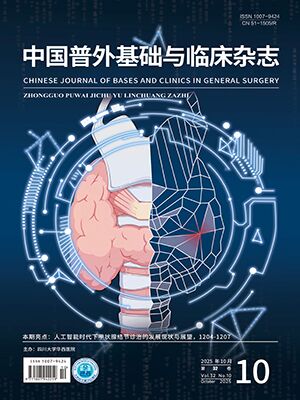| 1. |
Hu J, Liu ZS, Tang SL, et al. Effect of hydroxyapatite nanoparticles on the growth and p53/cMyc protein expression of implanted hepatic VX2 tumor in rabbits by intravenous injection [J]. World J Gastroenterol, 2007, 13(20): 27982802.
|
| 2. |
Baumann S, Fas SC, Giaisi M, et al. Wogonin preferentially kills malignant lymphocytes and suppresses Tcell tumor growth by inducing PLC gamma1 and Ca2+dependent apoptosis [J]. Blood, 2008, 111(4): 23542363.
|
| 3. |
Li G, Dong S, Qu J, et al. Synergism of hydroxyapatite nanoparticles and recombinant mutant human tumor necrosis factoralpha in chemotherapy of multidrug resistant hepatocellular carcinoma [J]. Liver Int, 2010, 30(4): 585592.
|
| 4. |
关键, 胡道予, 孙振纲, 等. 经动脉灌注纳米微粒治疗兔肝VX2肿瘤的实验研究 [J]. 放射学实践, 2007, 22(8): 786789.
|
| 5. |
Wang A, Yin H, Li D, et al. Effects of organic modifiers on the sizecontrolled synthesis of hydroxyapatite nanorods [J]. Appl Surf Sci, 2007, 253(6): 33113316.
|
| 6. |
Wang A, Yin H, Li D, et al. Sizecontrolled synthesis of hydroxyapatite nanorods in the presence of organic modifiers [J]. Mater Lett, 2007, 61(10): 20842088.
|
| 7. |
Saha SK, Banerjee A, Bancrjee, et al. Synthesis of nanocrystalline hydroxyapatite using surfactant template systems: Role of templates in controlling morphology [J]. Mater Sci Eng C, 2009, 29(7): 22942301.
|
| 8. |
Salarian M, SolatiHashjin M, Shafiei SS, et al. Templatedirected hydrothermal synthesis of dandelionlike hydroxyapatite in the presence of cetyltrimethylammonium bromide and polyethylene glycol [J]. Ceram Int, 2009, 35(7): 25632569.
|
| 9. |
Li Y, Tjandra W, Tam KC. Synthesis and characterization of nanoporous hydroxyapatite using cationic surfactants as templates [J]. Mater Res Bull, 2008, 43(89): 23182326.
|
| 10. |
曹献英, 李世普, 张然, 等. 羟基磷灰石纳米粒子对人肝癌细胞增殖及细胞周期的作用研究 [J]. 肿瘤防治杂志, 2003, 10(3): 256258.
|
| 11. |
Nurse P. A long twentieth century of the cell cycle and beyond [J]. Cell, 2000, 100(1): 7178.
|
| 12. |
张传海, 许戈良, 葛勇胜, 等. 亚砷酸对肝癌细胞增殖及PCNA, cMyc蛋白表达的影响 [J]. 第四军医大学学报, 2005, 26(14): 13031306.
|
| 13. |
Suehiro T, Matsumata T, Itasaka H, et al. Clinicopathologic features and prognosis of resected hepatocellular carcinomas of varied sizes with special reference to proliferating cell nuclear antigen [J]. Cancer, 1995, 76(3): 399405.
|
| 14. |
尹美珍, 李世普, 韩颖超. 羟基磷灰石纳米粒子对肝癌细胞PCNA表达的影响 [J]. 武汉理工大学学报, 2007, 29(8): 5861.
|
| 15. |
Kannan TP, Nik Ahmad Shah NL, Azlina A, et al. In vivo chromosome aberration test for hydroxyapetite in mice [J]. Med J Malaysia, 2004, 59(Suppl B): 115116.
|
| 16. |
Itokazu M, Sugiyama T, Ohno T, et al. Development of porous apatite ceramic for local delivery of chemotherapeutic agents [J]. J Biomed Mater Res, 1998, 39(4): 536538.
|
| 17. |
Benghuzzi H. Longterm sustained delivery of 3′azido2′, 3′dideoxythymidine in vivo by means of HA and TCP delivery devices [J]. Biomed Sci Instrum, 2000, 36: 343348.
|
| 18. |
齐志涛, 曹献英, 韩颖超, 等. 纳米磷灰石对人肝癌细胞端粒酶基因表达的影响 [J]. 武汉理工大学学报, 2004, 26(7): 4648.
|
| 19. |
王宁, 李玉, 刘洁. 肝癌患者多药耐药基因检测及其对介入治疗疗效影响分析 [J]. 中国实验诊断学, 2006, 10(6): 572575.
|
| 20. |
何平, 李金龙, 陈勇, 等. 中晚期肝癌联合介入治疗175例报道 [J]. 中国普外基础与临床杂志, 2010, 17(6): 615617.
|
| 21. |
Brábek J, Constancio SS, Siesser PF, et al. Crkassociated substrate tyrosine phosphorylation sites are critical for invasion and metastasis of SRCtransformed cells [J]. Mol Cancer Res, 2005, 3(6): 307315.
|
| 22. |
潘胜利, 陈孝平, 张万广, 等. Paxillin和p130Cas蛋白在肝癌中的表达及意义 [J]. 中华外科杂志, 2006, 44(23): 16481649.
|
| 23. |
李高鹏, 陈孝平, 黄志勇, 等. 碘油羟基磷灰石纳米粒对兔VX2肝肿瘤Paxillin和P130Cas表达的影响 [J]. 腹部外科, 2008, 21(3): 181183.
|
| 24. |
王宁, 李玉, 刘洁. 肝癌患者多要耐药基因检测及其对介入治疗疗效影响分析 [J]. 中国实验诊断学, 2006, 10(6): 572575.
|
| 25. |
Uggla B, Sthl E, Wgster D, et al. BCRP mRNA expression v. clinical outcome in 40 adult AML patients [J]. Leuk Res, 2005, 29(2): 141146.
|
| 26. |
Li G, Chen X, Wang Q, et al. The role of four multidurg resistance proteins in hepatocellular carcinoma multidrug resistance [J]. J Huazhong Univ Sci Technolog Med Sci, 2007, 27(2): 173175.
|
| 27. |
叶露, 李高鹏, 宋建新, 等. 碘油羟基磷灰石纳米粒对兔VX2肝肿瘤多药耐药相关蛋白表达的影响 [J]. 胃肠病学和肝病学杂志, 2010, 19(5): 437439.
|
| 28. |
叶义标, 陈涛. 肝癌血管生成与抗血管生成治疗的研究进展 [J]. 中国普外基础与临床杂志, 2009, 16(10): 861865.
|
| 29. |
徐涛, 陈孝平, 郭永宪, 等. 纳米材料碘油混悬液栓塞对肝肿瘤金属蛋白酶表达的影响 [J]. 中华消化杂志, 2008, 28(5): 335336.
|
| 30. |
徐涛, 陈孝平, 郭永宪, 等. 纳米材料碘油混悬液栓塞后兔VX2肿瘤组织MT1MMP表达改变的意义 [J]. 中华外科杂志, 2008, 46(8): 606609.
|
| 31. |
Weidner N. Current pathologic methods for measuring intratumoral microvessel density within breast carcinoma and other solid tumors [J]. Breast Cancer Res Treat, 1995, 36(2): 169180.
|
| 32. |
孙振纲, 董胜利, 李高鹏, 等. 碘油羟基磷灰石纳米粒对兔VX2肝肿瘤生长及血管新生的作用 [J]. 华中科技大学学报(医学版), 2009, 38(3): 325329.
|
| 33. |
张艳玲, 梁后杰, 肖文华, 等. 细胞凋亡、PCNA、p53和Fas与肝细胞癌临床病理特征关系的研究 [J]. 第三军医大学学报, 2004, 26(24): 21912193.
|
| 34. |
罗佳滨, 魏凤香, 孟祥才, 等. 羟基磷灰石纳米粒子诱导肝癌SMMC7721细胞凋亡的研究 [J]. 中国老年学杂志, 2006, 26(1): 7981.
|
| 35. |
Feng LF, Zhong M, Lei XY, et al. Bcl2 siRNA induced apoptosis and increased sensitivity to 5fluorouracil and HCPT in HepG2 cells [J]. J Drug Target, 2006, 14(1): 2126.
|
| 36. |
Kanda T, Yokosuka C, Imazeki F, et al. Enhanced sensitivity of human hepatoma cells to 5fluorouracil by small interfering RNA targeting Bcl2 [J]. DNA Cell Biol, 2005, 24(12): 805809.
|
| 37. |
魏凤香, 张涛, 李红枝, 等. 羟基磷灰石纳米粒子诱导肝癌SMMC7721细胞凋亡后bcl2和bax表达的变化 [J]. 中国老年学杂志, 2008, 28(13): 12611263.
|




